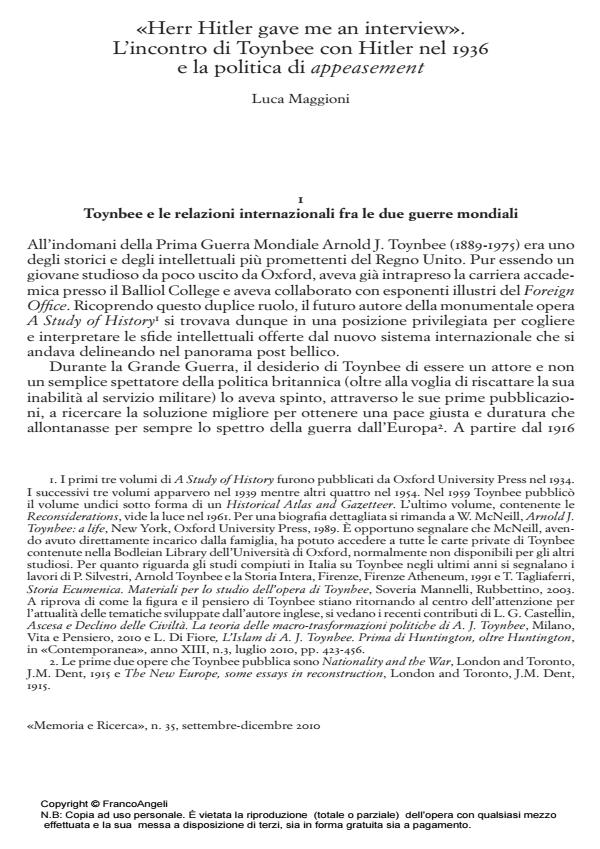«Herr Hitler gave me an interview». L’incontro di Toynbee con Hitler nel 1936 e la politica di appeasement
Titolo Rivista MEMORIA E RICERCA
Autori/Curatori Luca Maggioni
Anno di pubblicazione 2011 Fascicolo 2010/35
Lingua Italiano Numero pagine 25 P. 137-161 Dimensione file 885 KB
DOI 10.3280/MER2010-035008
Il DOI è il codice a barre della proprietà intellettuale: per saperne di più
clicca qui
Qui sotto puoi vedere in anteprima la prima pagina di questo articolo.
Se questo articolo ti interessa, lo puoi acquistare (e scaricare in formato pdf) seguendo le facili indicazioni per acquistare il download credit. Acquista Download Credits per scaricare questo Articolo in formato PDF

FrancoAngeli è membro della Publishers International Linking Association, Inc (PILA)associazione indipendente e non profit per facilitare (attraverso i servizi tecnologici implementati da CrossRef.org) l’accesso degli studiosi ai contenuti digitali nelle pubblicazioni professionali e scientifiche
Arnold J. Toynbee was the author of the twelve-volume A Study of History on rise and fall of civilizations. After the First World War he also played a crucial role as political analyst at the Royal Institute of International Affairs. He was director of studies from 1924 to 1943 and supervised the Institute’s Surveys of International Affairs. Because of Toynbee’s harsh comments about Hitler’s murders of S.A. in 1934, the English historian was surprisingly invited by the German chancellor for a private interview. At that time Hitler was trying to convince the European audience of his peaceful intentions. During the interview, which took place on the 28th February 1936, he talked about several critical points of current international affairs such as the Russian threat, the colonies and his friendly intentions toward Great Britain. Toynbee never published the interview but was asked to write a memorandum of his conversation with Hitler for the British Government. Although in his book Acquaintances, written in 1967, Toynbee stated that he had never trusted Hitler’s proposed agreement with Great Britain, in the unpublished memorandum Toynbee seems to support a future arrangement with the Germans. He also stressed the right of Hitler’s claims and his good attitude toward Great Britain. The real value of these documents can only be understood inside the cultural framework of the "Cliveden set", a group of appeasers in the British establishment that supported an Anglo-German appeasement. Thus, it seems that many appeasers and members of the Government, such as foreign minister Eden, were encouraged by Toynbee’s memorandum to pursue a soft line in response to Hitler’s occupation of the Rhineland on 7th March 1936 and to reach an agreement with Germany.
Parole chiave:Toynbee; interview; Hitler; appeasement; Cliveden set; Anglo-German Relations
Luca Maggioni, «Herr Hitler gave me an interview». L’incontro di Toynbee con Hitler nel 1936 e la politica di <i>appeasement</i> in "MEMORIA E RICERCA " 35/2010, pp 137-161, DOI: 10.3280/MER2010-035008